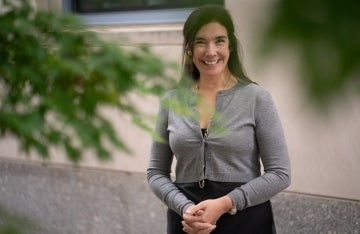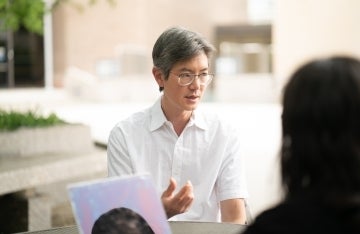Numerous Annenberg Faculty and Alumni in New Book: The Oxford Handbook of Political Communication
The handbook focuses on the greatest theoretical contributions to the field of political communication.

Photo Credit: Katie Moum / Unsplash
Oxford University Press has published the hardcover edition of The Oxford Handbook of Political Communication, which is co-edited by Annenberg Professor Kathleen Hall Jamieson and Annenberg alumna Kate Kenski (Ph.D. '06). The book, a wide-ranging examination of the theory and practice of the field of political communication, features 62 essays by many of the discipline’s most insightful scholars and serves both as an indispensable overview and a definitive guide to research in the field.
“This handbook focuses on the greatest theoretical contributions that political communication has made to the field,” said Kenski of the University of Arizona. Kenski, a distinguished research fellow at the Annenberg Public Policy Center (APPC), added: “It provides scholars and students with a detailed summary of what those contributions are and a sense of the history as well. And it offers valuable recommendations on where the field needs to go next to build upon those contributions in order to truly understand our political environment.”
As a scholarly field, political communication developed during the first half of the 20th century amid two world wars and the arrival of movies, radio and, later, television. A hybrid, political communication draws from and overlaps the related fields of communication, political science, sociology, social and political psychology, neuroscience, and journalism.
Among the diverse topics covered by the Oxford handbook are theories of media bias; the political uses and abuses of civility and incivility; framing; agenda setting; selective exposure theory; the hostile media effect; cultivation theory and the construction of political reality; the dilemmas of deliberative democracy; political advertising; civic norms and political socialization; how to think normatively about news and democracy; music as political communication; and the political effects of entertainment media.
The chapters were initially presented at a conference at the Annenberg Public Policy Center (APPC), and the volume is rich with contributions from scholars affiliated with the policy center and the Annenberg School. Essays contributed by ASC faculty, staff, and alumni include:
- "Political Communication: Then, Now, and Beyond" — Jamieson and Kenski
- "Creating the Hybrid Field of Political Communication" — Jamieson
- "Dilemmas of Deliberative Democracy" — Professor Emeritus Elihu Katz
- "Political Advertising" — Timothy W. Fallis (Ph.D. '14)
- "Political Uses and Abuses of Civility and Incivility" — Jamieson, doctoral student Allyson Volinsky, APPC researcher Ilana Weitz, and Kenski
- "The Politics of Memory" — Nicole Maurantonio (Ph.D. '08)
- "The U.S. Media, Foreign Policy, and Public Support for War" — Sean Aday (Ph.D. '99)
- "Candidate Traits and Political Choice" — Bruce W. Hardy (Ph.D. '10)
- "Framing Inequality in Public Policy Discourse: The Nature of Constraint" — Professor Emeritus Oscar H. Gandy, Jr.
- "Selective Exposure Theories" — Natalie Jomini Stroud (Ph.D. '06)
- "The Hostile Media Effect" — Lauren Feldman (Ph.D. '08)
- "Public and Elite Perceptions of News Media in Politics" — Yariv Tsfati (Ph.D. '02)
- "Cultivation Theory and the Construction of Political Reality" — APPC research directors Patrick E. Jamieson and Daniel Romer
- "Two-step Flow, Diffusion, and the Role of Social Networks in Political Communication" — Brian Southwell (Ph.D. '02)
- "Disagreement in Political Discussion" — Lilach Nir (Ph.D. '04)
- "Collective Intelligence: The Wisdom and Foolishness of Deliberating Groups" — Professor Joseph Cappella, Jingwen Zhang (Ph.D. '16); and Professor Emeritus Vincent Price
- "Online News Consumption in the U.S. and Ideological Extremism" — APPC research director Kenneth M. Winneg (Ph.D. '09), et al
- "Political Discussion and Deliberation Online" — Jennifer Stromer-Galley (Ph.D. '02)
- "The Political Effects of Entertainment Media" — Professor and Dean Michael X. Delli Carpini
- "Theories and Effects of Political Humor" — Dannagal G. Young (Ph.D. '07)
- "Political Communication: Looking Ahead" — Kenski and Jamieson
The Oxford Handbook of Political Communication is also available as an eBook.
Media Contact
Michael Rozansky
(215) 746-0202
michael.rozansky@appc.upenn.edu



